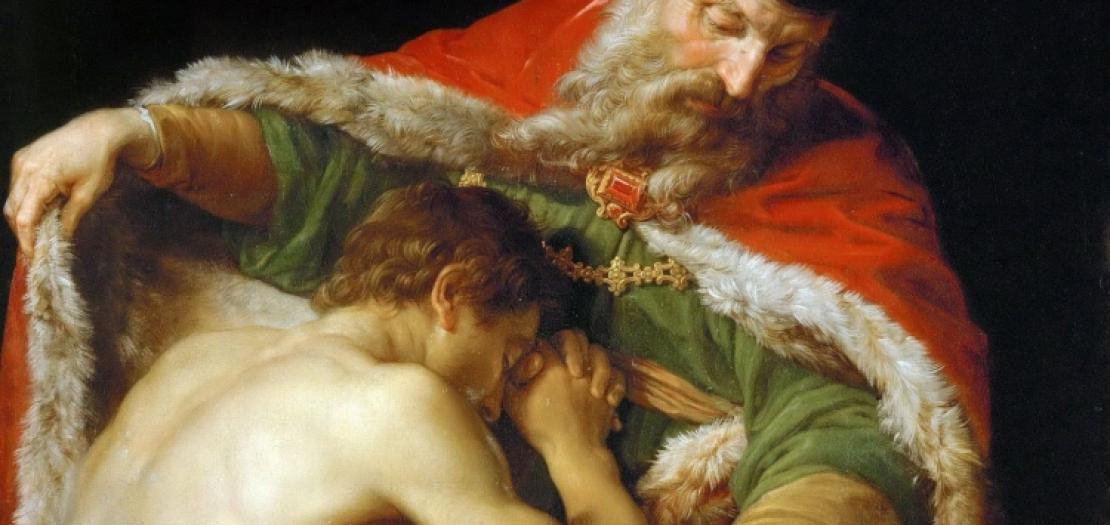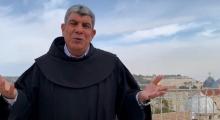Issued by the Catholic Center for Studies and Media - Jordan. Editor-in-chief Fr. Rif'at Bader - موقع أبونا abouna.org

Following is the text of the meditation by His Beatitude Cardinal Pierbattista Pizzaballa, Latin Patriarch of Jerusalem, for the fourth Sunday of Lent, dated March 30, 2025:
At the center of the parable told in today’s liturgy, (Luke 15:1-3,11-32) the well-known parable of the Merciful Father, is a house in which a father lives with his two sons.
A key to entering this passage, we find with a phrase found towards the end of the story, where we discover that the eldest son “became angry, and refused to enter the house.” (Luke 15:28)
So, there is a house into which a son does not want to go and prefers to stay outside.
We also discover that not only the eldest son but also the youngest son has problems with this house: he too is away from home. He has asked his father for his share of the inheritance and has left (“collected all his belongings and set off to a distant country” . (Luke 15:13) Nothing is known about where he went, except that this place is far from home.
And it is also known that the younger son, having gone far away, no longer found a home “he hired himself out to one of the local citizens who sent him to his farm to tend the swine.” (Luke 15:15)
The two brothers, who are very different, have at least this much in common: they struggle to get into the house.
The younger seems to leave out of a need for autonomy, seeking freedom without ties and obligations. But finally, as he stands alone with his failure, he finds another obstacle on his way back home, which can be well summarized in the thought that inhabits him: “I no longer deserve”. (Luke 15:19, 21) I no longer deserve to be called a son, no longer worthy to be in this house except as a hired hand, as a servant. So, the younger son thinks he can no longer enter the house because he is no longer worthy.
The eldest, on the other hand, considers himself worthy to enter the house, but he does not want to live in a house where his brother is, whom he also considers unworthy to be there (“But when your son returns who swallowed up your property with prostitutes, for him you slaughter the fattened calf”. (Luke 15:30)
So, there is a nice, big, cozy, rich house, but it seems that none of the children are able to live in it.
The solution to this problem is the father who, in order to get his children into the house, goes out himself to invite them, to beg them to come in.
He goes out to fetch his youngest son, for whom he has always waited. He goes out full of joy, with a love that does not make calculations, that does not weigh up the mistakes he has made and that does not make anyone feel guilty. He does not wait for him in the house, but moves, runs to him and immediately gives him the dignity of a son, which the time of distance could in no way erase (“While he was still a long way off, his father caught sight of him, and was filled with compassion. He ran to his son, embraced him and kissed him”. (Luke 15:20)
But he also approaches his eldest son and urgently asks him to join the feast (“his father came out and pleaded with him”. (Luke 15:28). But this son is also far away: far from having understood the beauty of a love that had made him rich without him having to gain anything, without him having earned anything.
Two sons, both outside the house, both called to return to the house. This is simply the picture of our lives, the story of every human being.
We are children, each of us. And so often we find it difficult to let ourselves be loved, to let ourselves be loved by God and by our brothers and sisters, not because of what we can do, but simply because we are children.
That is why God undertakes His own way, His own way, goes out Himself to seek us and bring us home.
In concrete terms, this means that God is willing to get lost in our distances in order to reach us where we are. He sends His son Jesus to become our traveling companion, and He descends with us into our depths.
God does this in the hope that this immeasurable love will convince us of our indestructible dignity as children, given to everyone without distinction, as a feast open to all, a wedding banquet to which we will always return.
+Pierbattista







